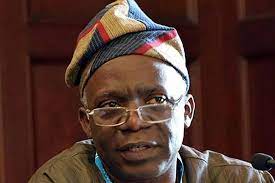Human rights lawyer, Femi Falana, SAN, has criticised the gifting of houses to judges by the Minister of the Federal Capital Territory, Nyesom Wike.
In October, the minister initiated the Design and Construction of 40 Judges’ Quarters in the Katampe District of the capital, Abuja. The move has stirred controversy, with many arguing that it is unethical.
Speaking on Politics Today on Channels Television on Wednesday, Falana argued that it is improper for the executive to give gifts to members of the judiciary, particularly judges.
“The Minister of the Federal Capital Territory operates like a state governor by virtue of Section 299 of the Constitution. Therefore, he cannot decide to build 40 houses, allocating ten to the federal high court, ten to judges in the FCT high court, and ten to the court of appeal and the supreme court—no,” Falana stated.
“As a federal government minister akin to a state governor, his budget is confined to the affairs of the FCT. Thus, he cannot, as the head of the FCT, distribute gifts of cars or houses to judges in the federal high court, the court of appeal, and the supreme court.
“Secondly, cases come before these courts. On the principle of equality before the court, you cannot be seen to be providing cars or houses to the judges who will hear your cases.”
Falana added that this is precisely why judicial autonomy is enshrined in the Constitution, to prevent judges from having to rely on the executive for cars and housing.
He emphasised that the Constitution has granted financial autonomy to the judiciary, allowing it to manage its own budget.
Falana also criticised Wike for demolishing private properties in the FCT, describing the practice as “primitive” and unlawful.
According to him, such demolitions are not sanctioned by the Urban and Regional Planning Act applicable in the FCT.
“In the FCT, if a property is in breach of the law, the case must first be referred to the Urban and Regional Planning Board. If the property owner loses, they can appeal to the Urban and Regional Tribunal. Failing that, the case may proceed to the High Court, where a demolition order might be issued.”
‘Not my policy’
Meanwhile, on Wednesday, Wike denied claims that the housing project for judges in Abuja is intended to influence the judiciary for political ends.
According to Wike, the construction of houses for judges is not his own policy but part of the welfare initiatives President Bola Tinubu introduced to promote the independence of the judiciary.
During a media briefing, Wike clarified that the project was included in the 2024 budget and that he is merely responsible for implementing it.
Wike explained: “(Tinubu said) ‘Where are the judges living? They have no homes and are therefore vulnerable to political manipulation. As a president who seeks to ensure judicial independence, judges must have their own homes.’
“I am not the President; I am merely fortunate to have been appointed as a minister under this administration, with the responsibility of implementing his policies. And Mr President made it clear that this is his intention, so we are working to achieve it.
“It was approved by Mr President, sent to the National Assembly in the 2024 budget, and is a part of the law, passed by the National Assembly and assented to by Mr President. So, what’s the issue? I am merely the implementer.
“The Federal Executive Council approved the contract and all related details—it is not my policy. How can I be criticised for implementing what the Federal Government has approved?”



